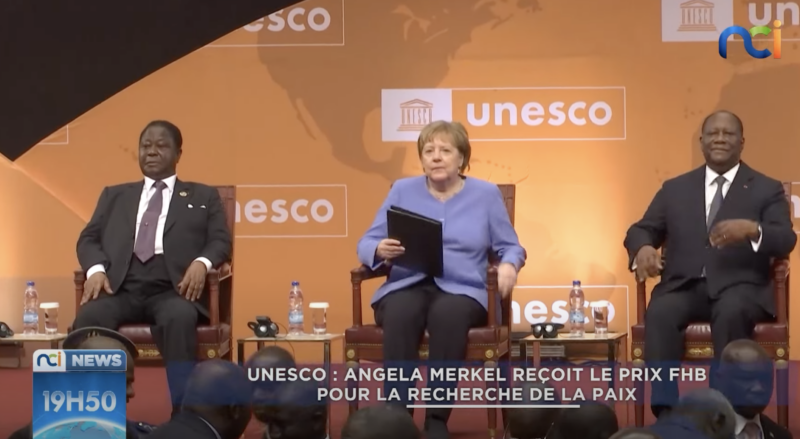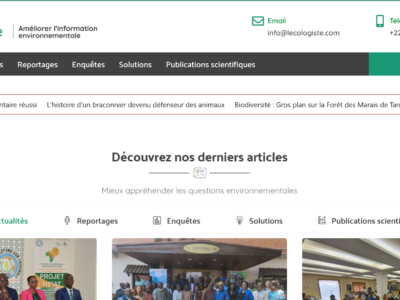
Screen capture from NCI News‘s YouTube channel.
The former German Chancellor Angela Merkel's visit to Côte d'Ivoire for the award of the Félix Houphouet-Boigny/UNESCO prize enabled a meeting between three key figures of the Ivorian political stage — Alassane Ouattara, president of Côte d'Ivoire since 2010; Henri Konan Bédié, president of the Parti démocratique de Côte d'Ivoire – Rassemblement démocratique africain (PDCI-RDA) opposition party, and former president from to and Laurent Gbagbo, president of the Parti des peuples africains – Côte d'Ivoire (PPA-CI) opposition party, another former president from 2000 to 2010. This comes at a time when Côte d'Ivoire is struggling to rebuild itself after a long political, ethnic and military crisis.
On February 8, 2023, Merkel received, in Abidjan, the Félix Houphouët-Boigny/UNESCO prize 2022 for peace-seeking. This prize, established in 1989, is to:
honorer les personnes vivantes, institutions ou organismes publics ou privés en activité ayant contribué de manière significative à la promotion, à la recherche, à la sauvegarde ou au maintien de la paix, dans le respect de la Charte des Nations unies et de l’Acte constitutif de l’UNESCO.
honour living individuals and active public or private bodies or institutions that have made a significant contribution to promoting, seeking, safeguarding or maintaining peace, in conformity with the Charter of the United Nations and the Constitution of UNESCO.
The Félix Houphouët-Boigny-UNESCO prize has previously recognized Nelson Mandela, Yasser Arafat, Yitzhak Rabin, Lula da Silva, and François Hollande. The former German Chancellor has been hailed on 14 occasions as the most powerful woman in the world by Forbes magazine from 2006 to 2020, with the exception of 2010. Suggested rewrite: The former German chancellor was named the most power woman in the world by Forbes magazine fourteen times from 2006 to 2020, with the exception of 2010.During her 16 years at the helm of Germany, she was viewed as one of the most influential political personalities in the European Union.
Today Merkel is distinguished by her actions in support of the search for world peace, particularly for her decision to welcome into Germany in 2015 more than 1 million refugees from Syria, Iraq, Afghanistan and Eritrea. When the Civil War in Syria that broke out in March 2011 forced millions of Syrians into exile, Germany received many on the strength of her decision. By taking this stance, for which she came close to paying a high political price, Merkel has demonstrated her embrace of humanist values. Accordingly, her recognition by the UNESCO prize comes on top of the High Commission of the United Nations for Refugees’ Nansen prize, which she received in October 2022 for the same causes. In an interview with VOA Afrique, Merkel makes the point that human rights are a basic principle:
Respecter, préserver, partager les droits humains c'est la mission de chacun d'entre nous. Nous avons décidé qu'il était nécessaire de respecter ces principes dans notre politique migratoire. Cela n'a été possible que parce que nombre de personnes se sont retroussé les manches sur le terrain.
Respecting, preserving, sharing human rights is the mission of every one of us. We have decided it was necessary to respect these principles in our migration policy. That has only been possible because numerous people rolled up their sleeves on the ground.
In the same article, Audrey Azoulay, Director General of UNESCO, testifies to Merkel's political courage on Voa Afrique on the awarding of the prize:
Le jury a voulu distinguer la décision courageuse prise en 2015 d’accueillir plus d’un million de réfugiés quand au même moment tant de voix appellaient à clôturer l’Europe. Vous avez été, à ce moment-là, la vision du courage en politique.
The jury wanted to commend the courageous decision taken in 2015 to accept over a million refugees, at the very moment so many voices were calling for the fencing off of Europe. You were, at that moment, the vision of courage in politics.
For his part, Henri Konan Bédié, Félix Houphouët-Boigny‘s successor, first president of the Republic of Côte d'Ivoire, and patron of the prize, evokes Merkel's qualities in the transformation of the world in an article for Anadolou Agency:
Vous êtes une digne héritière de Félix Houphouët Boigny dans les grandes dimensions de votre action pour construire la paix au profit de ceux et celles qui souffrent ; vous êtes une héritière remarquable des grands hommes et des grandes femmes d’action qui dans le monde entier ont été sensibles à la peine de l’autre, au respect de sa liberté, de son intégrité.
You are a worthy heir of Félix Houphouët Boigny in the wide scope of your action to build peace on behalf of those who suffer; you are a notable heir of the great men and women of action worldwide who have been sensitive to others’ pain, to respecting their freedom and their integrity.
According to the Anadolou Agency, Alassane Ouattara, the current President of Côte d’Ivoire, pays tribute to Merkel's altruism and to her “great lesson in humanism” in a world falling increasingly prey to the tide of identity politics. He adds in a tweet that she has reminded world leaders of their duty of solidarity with regard to all human beings, whatever their race, their origin or their religion.
Mes chaleureuses félicitations à Mme Angela Merkel, ancienne Chancelière de l'Allemagne, lauréate du prestigieux Prix Félix Houphouët-Boigny pour la Recherche de la Paix de l’#UNESCO. pic.twitter.com/tVW08bbtBO
— Alassane Ouattara (@AOuattara_PRCI) February 8, 2023
My warmest congratulations to Mrs Angela Merkel, ex-Chancellor of Germany, recipient of #UNESCO‘s prestigious Félix Houphouët-Boigny Prize for the Seeking of Peace. pic.twitter.com/tVW08bbtBO
— Alassane Ouattara (@AOuattara_PRCI) February 8, 2023
A prize that recognizes women's contribution
Following the announcement of the prize, Merkel decided to donate the whole of her award — USD 150,000 — to Côte d'Ivoire's Aid Association for Childhood in Danger, who take in children who are have been victims of abuse and exploitation, reported by the media channel Mali Actu on their Twitter account.
Angela Merkel reçoit le Prix FHB Unesco pour la paix – https://t.co/GKZw8puPRc #Mali
L’ancienne chancelière de la République fédérale d'Allemagne, Angela Merkel, a remis le chèque accompagnant le Prix à l’ONG ivoirienne Association nationale d’aide à l’enfance en danger.
… pic.twitter.com/Ujaqcmqgib— maliactu (@maliactu) February 9, 2023
Angela Merkel is receiving the FHB Unesco Prize for Peace – https://t.co/GKZw8puPRc #Mali
The former Chancellor of the Federal Republic of Germany, Angela Merkel, has donated the check which accompanies the prize to the Ivorian Association nationale d’aide à l’enfance en danger.
… pic.twitter.com/Ujaqcmqgib— maliactu (@maliactu) February 9, 2023
But the Félix Houphouët-Boigny/UNESCO prize also recognizes a second woman: Julienne Lusenge, a Congolese human rights activist, received the Honorable Mention of the jury, presided over by Denis Mukwege, her compatriot and 2018 Nobel Peace Prizewinner. Lusenge is recognized for her commitment to women victims of sexual violence in the Democratic Republic of Congo. The activist also refers to it on her Twitter account.
C’est un grand honneur pour moi de recevoir à ce jour la mention d’honneur Félix Houphouët Boigny-UNESCO.
Elle est notre, et je la partage avec toutes les femmes et filles congolaises qui paient aujourd’hui en #RDC le lourd tribut de l’insécurité et des conflits armés.#FélixHouphouët pic.twitter.com/J37wi56Qmu— Lusenge Julienne (@LusengeJ) February 8, 2023
It is a great honour for me to be receiving today the Félix Houphouët Boigny-UNESCO Honorable Mention.
It is all of ours, and I share it with all Congolese women and girls who are paying today in #DRC the heavy tribute of insecurity and armed conflict.#PrixFHB pic.twitter.com/J37wi56Qmu— Lusenge Julienne (@LusengeJ) February 8, 2023
Côte d’Ivoire sends out a message of peace to the world, but also to its own people
The prizegiving award ceremony for the German ex-Chancellor was an opportunity for Ivorians to see peace being celebrated and consolidated. But above all, this event allowed the public reunion of the highest political figures in the country. So, the former Côte d'Ivoire presidents Laurent Gbagbo and Henri Konan Bédié, both fierce opponents of Alassane Ouattara, the current head of state, were present at his side. This marks their first joint public appearance since July 2022, at a time when the country is gearing up for regional and municipal elections, in October and November 2023, respectively.
Ouattara publicly thanked his rival Gbago:
Je voudrais traduire mes remerciements à Laurent Gbagbo, mon cadet. En répondant à notre invitation, il honore la mémoire du président Félix Houphouët-Boigny et ses idéaux de paix et marque son attachement à la paix.
I should like to pass on my thanks to my young brother, Laurent Gbagbo. In responding to our invitation, he is honoring the memory of President Félix Houphouët-Boigny and his ideals of peace, and marking his attachment to peace.
This appeal to the country for peace is a clear reference to the risks of instability. Even if it is difficult to read the runes concerning the probable outcome of the forthcoming elections, it is clear that the stakes are high: it is the case that Gbago is participating this time with his party, PPA-CI, whereas he was not in the running in 2018 when the Rassemblement des Houphouëtistes pour la Démocratie et la Paix (RHDP), which supported Ouattara, won 18 regions, against six for Bédié's PDCI-RDA.






